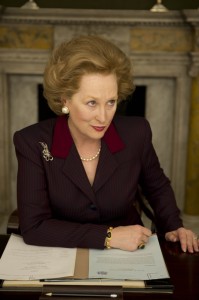Meryl Streep plays Margaret Thatcher in “The Iron Lady.” Jeanne has her review.
The Iron Lady
The Weinstein Company
Rated: PG-13
Running Time: 105 minutes
Studio Synopsis:
The Iron Lady is a surprising and intimate portrait of Margaret Thatcher (Meryl Streep), the first and only female Prime Minister of The United Kingdom. One of the 20th century’s most famous and influential women, Thatcher came from nowhere to smash through barriers of gender and class to be heard in a male dominated world. — (C) Weinstein

Jeanne’s Take:
British prime minister Margaret Thatcher portrayed by Meryl Streep, yes – who else? Another bravura performance by one of the four greatest living film actresses in the western world. Compelling performances also come from Jim Broadbent as Thatcher’s husband Denis and Alexandra Roach as young Margaret.
Directed by Phyllida Lloyd, a major figure in British theater and film, “The Iron Lady” is an ambitious portrait of Britain’s most controversial PM and the only PM to be elected to three consecutive terms (1979-1990).
Margaret Thatcher was elected to the House of Commons in 1959 and became prime minister of the UK in 1979. Although she resigned as PM in 1990 to avoid a defeat within her own party, Thatcher continued to serve in the House of Commons another two years. The queen bestowed a title on her in 1992, and then appointed Baroness Thatcher to the House of Lords.
Thatcher was the only child of a grocer. She attended Oxford University and trained as a chemist. Later she became an attorney (barrister), married a businessman, gave birth to fraternal twins and changed the course of British history, pretty much in that order. Because of her opposition to Marxism and the USSR, the former Soviet Union branded her “the iron lady.”
Someone once said Meryl Streep could read the telephone directory and produce Oscar material. Screenwriter Abi Morgan has provided a much better script than that, but with a soft focus on Thatcher’s hard core political views and actions. The emphasis is on Thatcher in retirement and intellectual decline, living through her memories after suffering a series of small strokes. While Streep is able to handle this phase of Thatcher’s life extremely well, the viewer is left wondering how much more exciting it would have been to see Thatcher in a chronological portrait of her tempestuous political career.
Margaret Thatcher developed and acted upon strongly held political views. She ended the program of free school milk for children over the age of seven, and increased the cost of school meals. In 1978 she made a speech where she claimed that people feared being “swamped” by immigrants. As prime minister she was determined to break the power of trade unions. Spending cuts led to a wave of strikes. The number of people unemployed doubled between 1979 and 1980. In 1984 coal miners struck for 12 months without success, due to the PM’s iron will. She was indifferent to the continuation of the Commonwealth of Nations and indifferent to apartheid in South Africa. She also opposed any closer integration with Europe. And she imposed a poll tax on the people of the UK.
Director Phyllida Lloyd skillfully blends news video with realistic recreations. We see the PM and her husband barely surviving the bombing of their hotel by terrorists from the IRA. Before she becomes PM, one of Thatcher’s advisors is murdered by an IRA car bomb.
“The Iron Lady” offers a few tantalizing moments of Question Time in the House of Commons, where each week the prime minister must defend her actions or inactions before an eloquent and boisterous opposition. Lloyd and screenwriter Morgan enlisted all the right people to create a believable House of Commons, since they were not allowed to film in Parliament itself, and it would have been wonderful to have more of the PM’s crises handled in this forum – highly entertaining as well as educational to the audience – but, no, this was not done.
The 1982 Falklands naval war between England and Argentina was a complex business, both diplomatically and militarily. England lost three destroyers, two frigates and nearly 300 sailors; Argentina suffered great loss of life as well. The ill-advised war tested Thatcher but turned out to be a victory for the prime minister; yet the subject is reduced to a few short scenes in this film.
One glaring omission is any mention of the royals. Thatcher is said to have had more than one philosophical difference with the queen over the future of the Commonwealth of Nations, for example. Criticisms were leaked, since the queen may not oppose any prime minister openly. No mention of that here. When England was at war over the Falklands, the queen and Thatcher were seen in photo ops walking side by side to demonstrate solidarity; no glimpse of that either.
Journalist Carol Thatcher has written about her mother; director Phyllida Lloyd utilizes that material to give us a portrait of a legend in winter. The PM’s son, Mark Thatcher, is absent from this film. Yet the only time Margaret Thatcher looked vulnerable in public was when her son went missing for six days during an international grand prix competition in 1982 (Paris to Dakar).
Denis Thatcher is brought to life vividly by Jim Broadbent. Margaret Roberts married him in 1951; he died in 2003. By all accounts it was a very good match and he was proud of her. Too often, though, director Phyllida Lloyd employs imaginary conversations with the dead husband as a lens through which to view Margaret Thatcher.
Meryl Streep can do no wrong: The Devil Wears Prada (2006); The Manchurian Candidate (2004); The Bridges of Madison County (1995); Ironweed (1987); Out of Africa (1985); Plenty (1985) – my personal favorite; Silkwood (1983) – also my personal favorite; The French Lieutenant’s Woman (1981).
See this film for the performances of Streep, Broadbent and Roach. For the actual history, visit a library or a bookseller.
